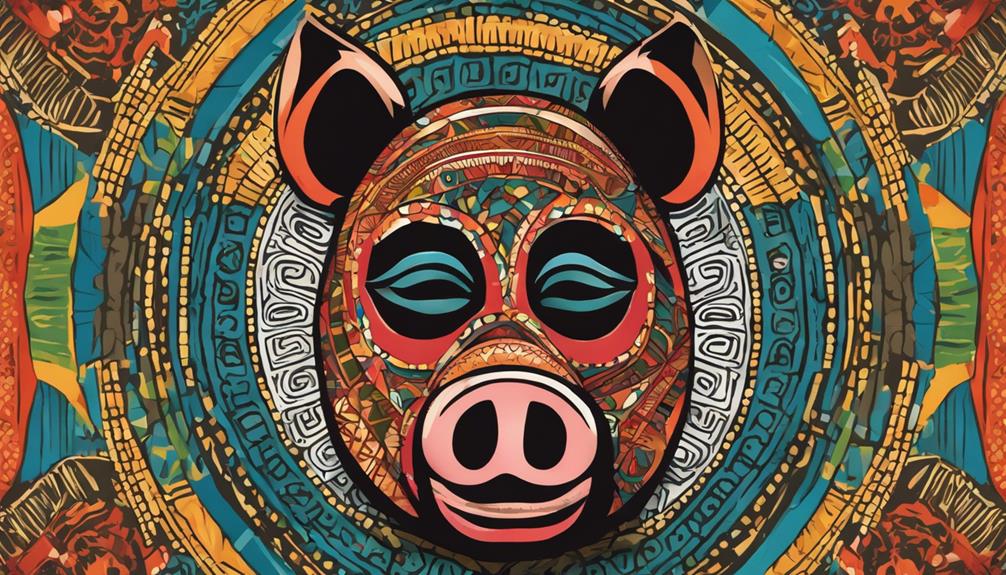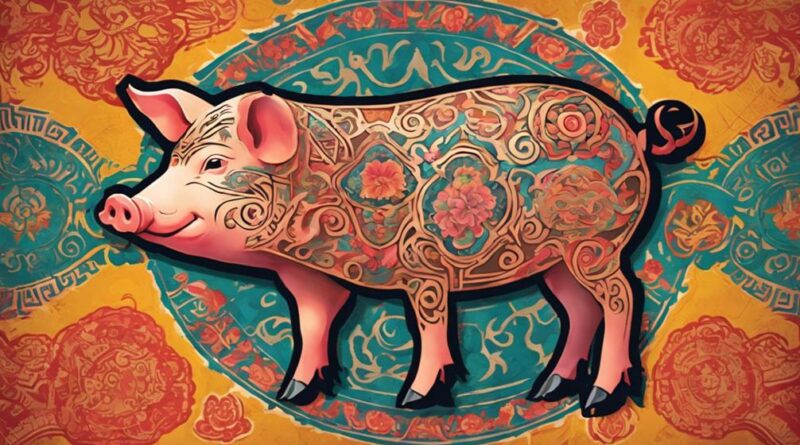10 Best Cultural Symbolisms of Pigs Explored
You might be surprised to learn just how deeply pigs have woven themselves into the tapestry of various cultures throughout history.
From ancient Chinese symbolism to Viking beliefs and beyond, the pig's significance goes far beyond what meets the eye.
As you explore the intricate connections between these intelligent animals and human societies, you'll uncover a fascinating world of symbolism waiting to be unraveled, shedding light on the diverse ways in which pigs have shaped our collective consciousness.
Ancient Chinese Symbolism
When exploring the cultural symbolisms of pigs, it's essential to delve into the intricate world of Ancient Chinese Symbolism. In Chinese folklore, pigs hold a significant place, especially in the Chinese zodiac where they're represented by one of the twelve animals. The Pig zodiac sign is associated with wealth, good fortune, and honesty. People born under this sign are believed to be kind, compassionate, and diligent.
In Chinese mythology and folklore, pigs are also seen as symbols of fertility and abundance. The image of a mother pig with piglets conveys the idea of a prosperous and harmonious family. Additionally, in ancient Chinese beliefs, the pig was considered a symbol of good luck and prosperity, often depicted with a chubby body and a happy expression.
Moreover, in Chinese culture, the pig isn't just a symbol of material wealth but also of spiritual nourishment. The pig's carefree and indulgent nature teaches people the importance of enjoying life's pleasures in moderation. This balance between work and leisure is a valuable lesson derived from the pig's symbolism in Chinese culture.
Viking Beliefs and Pigs
Pigs also held significant cultural symbolism among the Vikings, reflecting their beliefs and practices surrounding these animals. In Viking society, pigs played a crucial role in various rituals and ceremonies, often involving sacrifices to appease the gods and bring good fortune.
Here are some key aspects of Viking beliefs and practices related to pigs:
- Sacred Animal: Pigs were considered sacred animals in Viking culture, symbolizing fertility, prosperity, and abundance.
- Offerings to Deities: Vikings believed in offering pigs as sacrifices to their gods during important ceremonies and rituals.
- Symbol of Wealth: Owning a large number of pigs was a sign of wealth and high social status among the Vikings.
- Role in Feasting: Pigs were central to feasting and celebrations, where they were slaughtered and consumed in large gatherings.
- Connection to the Afterlife: Vikings believed that pigs had a connection to the afterlife, often buried alongside the deceased to accompany them in the next life.
Through their rituals and pig sacrifices, the Vikings integrated these animals into various aspects of their culture, attributing symbolic meanings that resonated deeply within their society.
Celtic Pig Representations
In Celtic culture, the representation of pigs held deep symbolic significance, reflecting intricate beliefs and customs. Celtic pig art often depicted these animals as symbols of abundance, fertility, and prosperity. Pigs were revered for their connection to the Earth and the cycles of nature in Irish pig folklore.
Celtic pig art showcased these animals as sacred beings, embodying the essence of the land and its bounties. The Celts believed that pigs were sacred creatures that brought good fortune and wealth to those who honored them. Pigs weren't only seen as valuable sources of food but also as spiritual guides and protectors.
In Irish pig folklore, tales often revolved around the wisdom and guidance that pigs provided to the people. They were believed to possess a deep understanding of the natural world and were seen as mediators between the physical and spiritual realms. Pigs were also associated with the concept of rebirth and transformation, symbolizing the cyclical nature of life and death.
Hinduism and the Sacred Pig
Sacred in Hinduism, the pig holds unique symbolism and significance within the religious and cultural context. In Hinduism, the pig is considered a sacred animal with deep spiritual significance. Here are some key points to understand its importance:
- Symbol of Fertility: The pig symbolizes fertility and abundance in Hindu culture, representing prosperity and growth.
- Connection to Varaha: Varaha, the boar avatar of Lord Vishnu, is a significant deity in Hindu mythology. The pig is revered for its association with this divine figure.
- Purification and Cleansing: Despite its reputation in other cultures, in Hinduism, the pig is seen as a symbol of purification and cleansing rituals.
- Symbol of Fearlessness: The pig's fearless nature is admired in Hinduism, symbolizing the courage to face challenges and obstacles.
- Role in Rituals: Pigs play a role in certain Hindu rituals and ceremonies, where their presence is believed to bring blessings and positive energy.
Pigs in Native American Cultures
Have you ever wondered about the significance of the pig in the diverse cultures of Native Americans? Pigs held various symbolic meanings in Native American cultures and were often included in ceremonies and rituals.
In many Native American tribes, pigs symbolized abundance, fertility, and prosperity. They were valued for their role in providing food and were seen as a sign of good fortune. Pigs were also associated with spiritual beliefs and were sometimes used in ceremonies to honor ancestors or seek blessings from the divine.
Pig ceremonies were an essential part of Native American rituals in some tribes. These ceremonies often involved offerings to the pigs as a way to show respect and gratitude for their role in sustaining the community. Pigs were considered sacred animals in many Native American cultures, and their presence was believed to bring blessings and protection to the tribe.
The Pig in Greek Mythology
Pigs in Native American cultures were revered for their symbolic significance, and similarly, in Greek mythology, the pig also holds a notable place in tales of gods and heroes. In Greek pig tales, these animals aren't merely farm animals but often play significant roles in the mythical stories that have been passed down through generations.
Here are some key points to understand the importance of pigs in Greek mythology:
- Transformation: Pigs are often associated with transformation in Greek mythology, symbolizing change and metamorphosis.
- Sacrificial Offerings: In ancient Greek rituals and ceremonies, pigs were commonly used as sacrificial offerings to the gods.
- Divine Companions: Some mythical pig characters were portrayed as divine companions to gods and goddesses, showcasing their sacred connection.
- Guardians of the Underworld: In Greek mythology, pigs were sometimes depicted as guardians or creatures residing in the underworld, adding a mystical element to their symbolism.
- Representation of Fertility: Pigs were also linked to fertility and abundance in Greek culture, symbolizing prosperity and growth.
Through these symbolic representations, the pig in Greek mythology transcends its physical form, embodying deeper meanings and playing integral roles in the rich tapestry of ancient Greek stories.
Pig Symbolism in African Traditions

In African traditions, the symbolism of pigs carries significant cultural importance. Pigs are often featured in various African rituals due to their spiritual significance. In many African cultures, pigs symbolize abundance, fertility, and prosperity. They're seen as valuable animals that bring good fortune and are often sacrificed in ceremonies to bring about blessings and ward off evil spirits.
In African rituals, the presence of pigs is believed to enhance the connection between the physical and spiritual worlds. The act of sacrificing a pig is seen as a way to communicate with ancestors and deities, seeking their guidance and protection. The pig's role in these ceremonies underscores its importance as a mediator between humans and the divine realm.
Moreover, pigs are also associated with transformation and renewal in African traditions. The pig's ability to root in the earth symbolizes a deep connection to the land and the cycles of nature. This connection reinforces the pig's role in rituals that mark important life events such as birth, marriage, and death.
Modern Interpretations of Pig Symbolism
Exploring the evolution of cultural perceptions, modern interpretations of pig symbolism reveal intriguing shifts in societal values and beliefs. In contemporary contexts, pigs carry a range of symbolic representations that reflect the complexities of human culture and the diverse meanings attached to these animals.
- Pigs in modern interpretations are often seen as symbols of abundance and prosperity, representing wealth and success in various cultures.
- The cultural significance of pigs has evolved to include notions of fertility and good fortune, with the animal symbolizing growth and new beginnings.
- Contrary to traditional taboos, some modern interpretations view pigs as symbols of intelligence and resourcefulness, highlighting their clever and adaptable nature.
- In contemporary meanings, pigs can also embody themes of indulgence and excess, symbolizing overconsumption and materialism in society.
- Modern interpretations of pig symbolism may also touch upon ideas of innocence and purity, emphasizing the gentle and affectionate qualities of these animals in certain cultural contexts.
Through these modern lenses, the symbolic weight of pigs in cultural narratives continues to shift, reflecting the dynamic nature of human perceptions and values in today's world.
Frequently Asked Questions
What Are the Specific Breeds of Pigs That Were Considered Sacred in Ancient Chinese Symbolism?
In ancient Chinese symbolism, certain pig breeds held sacred status due to their significance. These breeds were revered for their cultural importance and symbolic meanings.
The pig symbolism in ancient Chinese culture was deeply rooted in traditions and beliefs, making the sacred breeds highly valued. The cultural significance attached to these specific pig breeds played a crucial role in shaping various aspects of ancient Chinese society and rituals.
How Did Pigs Play a Role in Viking Burial Rituals and Ceremonies?
Pigs played a significant role in Viking customs and burial practices. In Norse tradition, pigs symbolized fertility, prosperity, and rebirth, making them important in honoring the deceased.
During burial rituals, pigs were often sacrificed and their remains placed alongside the deceased to ensure a prosperous afterlife. This practice demonstrated the Vikings' beliefs in the cyclical nature of life and death, as well as their reverence for the symbolic power of pigs in their culture.
Are There Any Specific Rituals or Traditions in Celtic Cultures That Involve Pigs?
In Celtic traditions, pigs held significant symbolism and were often involved in rituals and ceremonies. These ceremonies varied, but pigs were commonly associated with abundance, fertility, and prosperity.
They were sometimes offered as sacrifices to appease gods or spirits. The pig's role in Celtic culture reflected themes of nourishment and wealth, making it a revered animal in their customs and beliefs.
How Do Pigs Fit Into the Larger Hindu Pantheon of Sacred Animals?
In Hinduism, pigs have a unique place in the sacred animal representation. They hold cultural significance as they symbolize fertility and prosperity. Hindu symbolism views pigs as creatures of abundance and good fortune.
Their role in the larger Hindu pantheon of sacred animals highlights their importance in the religious and spiritual context. Pigs are revered for their positive attributes and contribute to the diverse tapestry of symbolism within Hindu traditions.
What Role Did Pigs Play in Native American Creation Stories and Folklore?
In Native American folklore, pigs hold significant symbolism in creation stories and traditions. They're often portrayed as creatures with mystical powers and connections to the spiritual world. These Native American pigs are intertwined with cultural beliefs and play essential roles in shaping their narratives and folklore.
Similarly to other cultures like the Chinese, Vikings, and Celts, pigs are revered and honored for their spiritual significance.
Conclusion
Overall, pigs have played significant roles in various cultures throughout history, symbolizing different meanings such as prosperity, fertility, and abundance.
From ancient Chinese beliefs to modern interpretations, the pig continues to be a cultural symbol with deep-rooted significance.
Whether worshipped as sacred animals or revered in mythological stories, the pig remains a versatile symbol that reflects the values and beliefs of diverse societies around the world.
